French Affair – German Affair – Russian Posture
In the framework of great power relations (the US – China – Russia), an odd crisis is brewing up between France and Russia. The tension has manifested itself in the relations between the countries as special disputes, like in fierce competition for power and influence in Africa and in Russia’s destructive strikes on French mercenaries in Ukraine.
On February 26, tension erupted visibly between France and Russia, when President Macron organized a hastily prepared security meeting in Paris and announced that sending European / NATO ground troops to Ukraine cannot be ruled out.
Another odd event / scandal took place also in Europe, while Russian RT-News published an audio, where German top military persons were discussing strikes on Crimean Bridge.
Controversies and disputes between Berlin, Paris and London seem to deepen and widen.
French Affair, what happened in Paris?
French President Emmanuel Macron has said it is key for Europe’s security to defeat Russia in Ukraine, amid urgent pleas for more weapons from Kyiv. His key message: “Russia cannot, must not win this war”
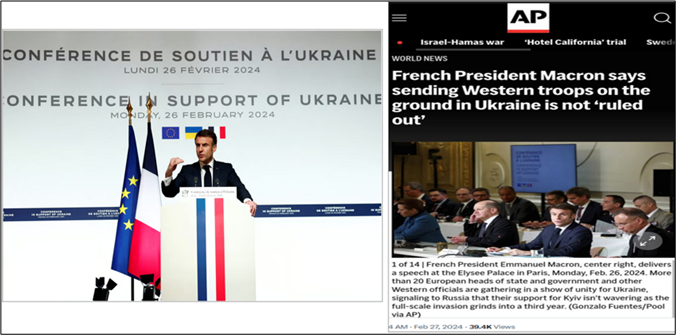
On February 26 in Paris, he said that European leaders had agreed to set up a coalition to give Ukraine medium- and long-range missiles and bombs. The meeting was attended by Scholz/Germany, Cameron/UK, Sanchez/Spain, Rutte/Netherlands, the leaders of the Scandinavian and Baltic countries, US Assistant Secretary of State O’Brien, Canadian Defense Minister Blair and others. Macron decided to raise the weight of the meeting with a loud statement: “We have discussed this [sending European troops to Ukraine], consensus has not yet been reached, but nothing can be ruled out.”
Kyiv is critically dependent on modern weapons supplies from its Western allies, particularly the US, to be able to continue fighting Russia. Macron announced also that a coalition would provide Ukraine with “missiles and bombs of medium and long range to carry out deep strikes”. He added: “We will do whatever it takes to ensure that Russia cannot win this war. We are convinced that the defeat of Russia is indispensable to security and stability in Europe.”
While France and the UK have already sent cruise missiles to Ukraine, respectively SCALPs and Storm Shadows, German Olaf Scholz reiterated that his government was not in favor of providing Kyiv with its long-range Taurus missiles.
The high-level gathering in Paris came as Ukraine, which has entered its third year of war against Russia’s invading forces, faces an ammunition gap on the front line and uncertainty over fickle Western support, despite having signed bilateral security deals with France, Germany, Italy, Canada and Denmark.
Macron does not rule out Europeans sending troops to Ukraine. “We are determined to do everything necessary for as long as necessary. That is the key takeaway from this evening,” the president concluded. Refusing “to let Russia win” while also rejecting diplomacy & negotiations implies the only acceptable outcome is to defeat Russia, which Russia deems to be an existential threat. Nuclear war is the next step in the escalation ladder after this. Since Maidan coup 2014, 10 years into this proxy war and western media are still obligated to refer to this as a “Ukraine-Russia war”.
February 27, Slovak Prime Minister Robert Fico said that the atmosphere at a combined meeting of EU and NATO officials on Ukraine that took place in Paris on Monday was belligerent and featured not a single word of peace. The prime minister emphasized that the Slovak government has called for establishing peace in Ukraine as soon as possible. “Our government is committed to peace and rejects a continuation of war and it will not send weapons to Ukraine. We are focused only on civilian projects,” Fico said.
Europeans’ duty, as per the UN Charter, should be to find ways to shut the conflict down, not extend it to the whole continent. While Europe has started and waged two previous world wars, this seems again that Europe is starting the 3rd world war, which would be utterly irresponsible.
Who is following – wide controversies and differences of opinions inside Europe and NATO
In response to Macron, a spokesperson for UK Prime Minister Rishi Sunak said his government had no plans for a large-scale military deployment to Ukraine, beyond the small number of personnel already training Ukrainian forces. A number of countries have already announced that they will not send troops to Ukraine: Germany (Defense Minister Pistorius), Czech Republic (Prime Fiala), Hungary (Foreign Minister Szijjártó), Poland (Prime Minister Tusk), Sweden (Prime Minister Kristersson), Slovakia (Prime Minister Fico), Greece (Prime Minister Mitsotakis), Finland (President Niinistö).
Other countries have not yet supported Macron’s suggestion. Dutch Prime Minister Mark Rutte said the issue of sending troops was “not on the agenda.” Slovak Prime Minister Robert Fico said that some Western countries were thinking about sending troops to Ukraine on the basis of bilateral agreements. At the same time, he strongly refused to send the Slovak military there. Poland is not going to send its soldiers to Ukraine, Deputy Minister of National Defense of the Republic Cezary Tomczyk said. “There is no such project or idea in Poland,” Tomczyk said on Polsat TV channel.
The issue of sending troops to Ukraine is the responsibility and sovereign decision of the EU countries, according to the European Commission. “European allies have been studying Paris’ plan to send troops to Ukraine for several weeks”, the US announced. At the same time, Biden made it clear that “the United States would not send troops to participate in military operations in Ukraine.” Looks like NATO countries told Macron “if you need it, send them yourself.”
NATO has no plans to send combat troops to Ukraine, NATO Secretary General Jens Stoltenberg told The Associated Press amid reports about alleged plans of a number of NATO member states to deploy their ground forces in the conflict zone. NATO allies have been providing unprecedented support to Ukraine since 2014, he said. This assistance has become much larger since the outbreak of the conflict in 2022, Stoltenberg noted.
What kind of comments – in France and elsewhere
French President Emmanuel Macron said on February 26 that at a meeting in Paris, where representatives of about 20 Western countries discussed further support for Ukraine in the conflict with Russia, the possibility of sending Western countries’ ground troops to Ukraine was raised. He remarked that no consensus was achieved but such a scenario could not be ruled out in the future.
On February 27, French Foreign Minister Stephane Sejourne explained that the presence of Western military in Ukraine might be necessary to provide some types of assistance, including demining operations and instruction of Ukrainian soldiers but that did not imply their participation in the conflict.
February 29, President Emmanuel Macron confirmed that he spoke about sending Western troops to Ukraine quite deliberately, claiming that “These are rather serious topics. My every word on this issue is weighted, thought through and calculated.”
“He’s gone crazy.” The French are shocked by Macron’s words about sending troops to Ukraine, writes Le Figaro.
Jean-Luc Mélenchon, the French party leader, said that one needs to seek a peaceful solution to the conflict and begin negotiations. “A war against Russia would be madness. This verbal belligerent escalation of one nuclear power against another major nuclear power is already an irresponsible act,” Mélenchon wrote on X commenting on Emmanuel Macron’s statements.
Commenting on Macron’s remarks on the topic, US National Security Council spokesman John Kirby said: “That’s a sovereign decision that every NATO ally would have to make for themselves. You heard Secretary General Jens Stoltenberg say himself he had no plans or intentions of putting troops on the ground under NATO auspices. And President Biden has been crystal clear since the beginning of this conflict: there will be no US troops on the ground in a combat role there in Ukraine.”
Some reactions of the American media to Macron’s idea to send NATO troops to Ukraine:
- CNN: This could lead to the largest ground conflict Europe has seen since World War II
- Wall Street Journal: Macron’s remarks were a departure from the restraint shown by Western allies. He tried to fill the leadership vacuum but his attempt to show Russia strength played against him
- Bloomberg: Macron’s comments contributed to the emergence of strategic ambiguity. Such a move, however, would directly involve NATO in the fight against Russia;
- New York Times: The negative attitude of European leaders towards the idea of Macron led to confusion about the unity of the alliance and provoked the question of whether his words should be considered as an empty threat
- USA Today: Macron’s rapidly bursting “trial balloon” demonstrated fears that Russia’s successes in Ukraine would push Moscow to threaten frontline Eastern European states when billions of dollars of badly needed American aid to Kiev remain blocked in the US Congress.
Commenting on Macron’s remarks, Kremlin Spokesman Dmitry Peskov pointed out that if Western troops were sent to Ukraine, a direct military conflict between NATO and Russia would be inevitable. He added that the NATO members should be aware of this and “ask themselves whether this is in their interests and, above all, in the interests of the citizens of their countries.”
Very critical articles and other comments have been published on Macron’s statement, some of examples here:
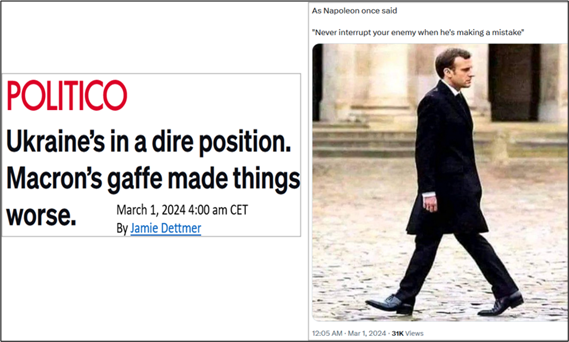
Ukraine’s in a dire position. Macron’s gaffe made things worse.
Politico, March 1, 2024

Macron’s Bid to Undermine NATO and the EU Hit the Bullseye
Martin Jay, a British journalist, February 28, 2024
Finian Cunningham, international writer, February 28, 2024
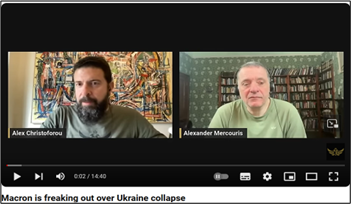
The Duran, by Alex Christoforou and Alexander Mercouris, “Macron is freaking out over Ukraine collapse”, February 27, 2024
Macron’s ignorance and misunderstanding
Macron seems unaware of the significant challenges EU countries face in supplying ammunition and equipment to Ukraine. Europe faces a considerable obstacle in producing 500,000 shells for Ukraine. The main EU countries—France, Germany, the UK, and Italy—have fewer than 1,000 tanks in active service and a considerable number of equipment lacking spare parts. Poland alone contributed over 320 tanks out of the 600 delivered to Ukraine, yet this number did not secure a victory, primarily due to logistical failures.
Is Macron suggesting that these European countries transition to a war economy? This might address some issues, but what about the limited raw materials and production capacity? The European arms industry would need at least 6-10 years to produce a number of tanks and armored vehicles comparable to what Russia currently produces, if there are enough raw materials. The only European tank manufacturer is KMW, which produces about 50-70 Leopard tanks annually. All other companies are focused on refurbishing and modernizing.
Depending on the number of states Macron’s speech includes, it remains a difficult and prolonged conflict. Russia may not win, but it can prolong the war significantly by switching to war mode and calling for national mobilization in a conflict with an imminent nuclear risk.
Macron appears to be politicizing a situation that affects millions of lives. In this hypothetical conflict, the investment and prosperity of Europe would disappear for years during a prolonged war with scarce raw materials, dubious productivity and further loss of life.
Having a one-sided approach to Ukraine crisis and publicly pledged to Ukraine’s victory/defeat of Russia, give neither room of maneuver to Europe nor enable any peace initiatives to be made. Thus, any worsening of the military situation will inevitably entail significant worsening of economic and financial situation in Europe. French new Foreign Minister just made a severe warning.
Why is France so active
There are some particular pain points in the relations between France and Russia.
Perhaps the worst one is the French speaking Africa, where Russia has managed to achieve large success at the cost of France. Several African countries have decreased their ties with France and increased significantly cooperation with Russia. As an example, the countries in the X-message below:
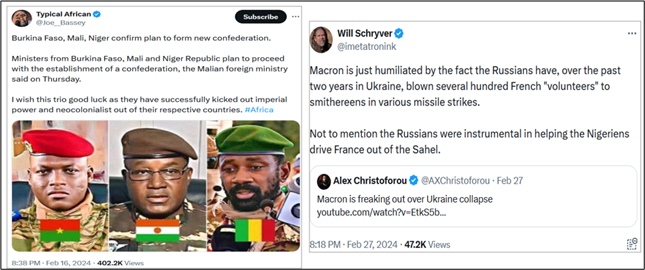
A special feature in France – Russia relations is their fierce competition in French-speaking Africa, where Russia has managed to gain more influence at the expense of France. France says that arms supply to Kiev cannot be stopped, despite the ongoing defeats of the Ukrainian army and despite production problems in most of European countries. France helps Kiev not only with weapons but also sends mercenaries with military experience to the Ukrainian frontlines. However, the Russian military is successfully coping with this threat. As a result of the recent strike in the city of Kharkiv, about 80 foreign mercenaries were killed and wounded, most of whom were French citizens.
Another pain point is the French troop losses in Ukraine. I have reported this topic, among others, in the article “Days of AFU are numbered, January 2024”, January 23, 2024.
During night January 16/17, Russian Forces made an air strike with Iskander missiles and S-300 rockets at the location of foreign mercenaries, in Kharkov, where mostly the French mercenaries were stationed there. According to the Russian Ministry of Defense, 60 foreign fighters were killed and 20 were hospitalized. The identification of corpses is carried out exclusively by representatives of the SBU department in the Kharkov region. The wounded servicemen were speaking French.
There’s no doubt President Emmanuel Macron wants to take on a mantle of global leadership and reverse faltering Western support for Ukraine but French politics will make that a hard role for him to pull off. As Ukrainian forces are pushed back on the battlefield and uncertainty persists over Western military aid, Macron has made a combative pitch to turn the tide, telling reporters that “Europe is at stake.” On Monday he promised a fresh push for artillery shells, floated the idea of western boots on the ground and announced a new coalition on long-range missiles.
Macron is clearly styling himself as a statesman who can step into the breach in the mold of Italy’s Mario Draghi, who famously steadied the crisis-stricken eurozone with his pledge to do “whatever it takes.” Indeed, Macron echoed that very phrase on Monday: “We’re determined to do whatever it takes for as long as it takes.”
German Affair
On Friday, March 1, RT Editor-in-Chief Margarita Simonyan disclosed a transcript of the audio that on the very day that Scholz gave assurances that NATO was not now and would not in the future be directly involved in the Ukraine conflict, Germany’s top brass was in fact mulling how to carry out a potential attack on the Crimean Bridge. She posted a transcript of the audio on her page on the VK social network.
In the conversation, the four senior officers, identified as Bundeswehr (Armed Forces) Brigadier General Frank Grafe, Air Force Command department head and German Air Force Inspector Ingo Gerhartz and two Space Command officers with the surnames Fenske and Frostedt, discussed instructions from German Defense Minister Boris Pistorius to work on the delivery of Taurus missiles to Ukraine. The military leaders said the weapons could be handed over in two tranches of 50 units each. Another topic in the discussion was how to hit the Crimean bridge.
German officers on tape planning an attack on Russia’s Kerch Strait Bridge, immediately after Berlin revealed that Britain is behind attacks on Russia – Incredible escalation! From Russia’s perspective, this will likely make both the German and British military legitimate targets.
This is now the number one news in Germany: “Russia bugged the generals of the Bundeswehr. Internal conversations about Taurus have been published” — RND. “Russia publishes alleged recordings of wiretapped telephone conversations” — Tagesschau. “Were the Luftwaffe talks bugged?” — WirtschaftsWoche. “Pistorius faces scandal over Taurus and wiretapping – Russia is secretly monitoring Bundeswehr officers” — NTV. “The military Counterintelligence Service is conducting an investigation on suspicion of spying on Bundeswehr soldiers” — Spiegel. “The Russians listened to the secret negotiations of German generals” — Bild. “Explosive audio recording: Taurus missiles to attack the Crimean Bridge?” — Berliner Zeitung. “Has Russia leaked the Bundeswehr talks?” — ZDF. “Did the Russians listen to the Luftwaffe? The hype surrounding a possible conversation about Taurus” — Focus. “They talked about the possibility of using Taurus: did the Russians listen to four high—ranking soldiers of the Bundeswehr?” – Business Insider.
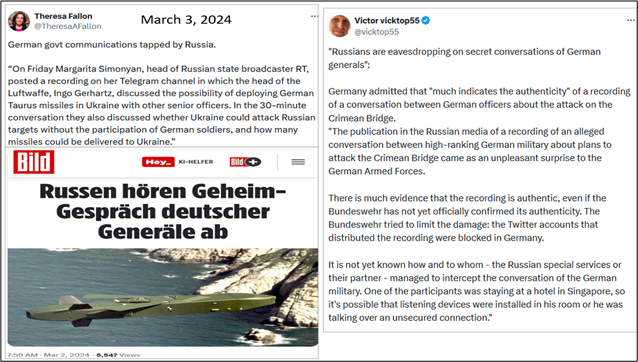
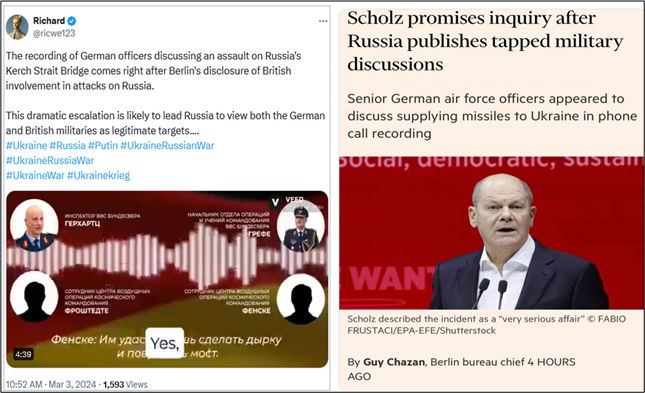
The recording of German officers discussing an assault on Russia’s Kerch Strait Bridge , March 3, 2024
German Chancellor Olaf Scholz remains opposed to the supply of Taurus cruise missiles to Ukraine. This was reported by the Frankfurter Allgemeine Zeitung newspaper, citing sources in the entourage of the head of government. Scholz opposes the transfer of Taurus to Kiev and justifies his refusal, in particular, by the fact that, in his assessment, the presence of German specialists on the ground is a necessary condition for programming missiles and targeting targets Ukraine.
German chancellor Olaf Scholz has promised a full investigation after Russia published a recording of a phone call between senior German air force officers in which they appeared to discuss supplying missiles to Ukraine. Scholz described the incident as a “very serious affair”. “It will be investigated very carefully, intensively and quickly,” he said. “It is also necessary to do so.”
Politicians from parties in Scholz’s coalition expressed concern that Russia may have eavesdropped on other sensitive conversations, and that government communications may no longer be adequately protected. The German defense ministry said: “According to our assessment, a Luftwaffe conversation was tapped. We cannot say for sure whether changes were made to the recorded or transcribed version that is circulating on social media.”
Konstantin von Notz, a senior Green MP, said “it must be swiftly established if the “eavesdropping scandal is a one-time event or a structural problem”. Marie-Agnes Strack-Zimmermann, head of the Bundestag defence committee, told the news agency RND that the Russians were trying to scare Scholz off from allowing the delivery of Taurus missiles.
Some conclusions of “German Affair”
A bombshell wiretap leak has set the intelligence and geopolitical world ablaze, revealing high ranking members of the German Bundeswehr openly discussing plans to supply the Taurus missiles and help Ukraine destroy Russia’s Kerch Bridge.
Many are understandably pinning the leak on Russia’s GRU but it seems just as plausible that it was leaked by German insiders themselves in order to thwart the plans of their own deepstate establishment, which is clearly bent on starting WWIII.
There is a top brilliant article about this episode in ZeroHedge by Tyler Durden, March 2, 2024: ‘A Complete Disaster For The German Govt’ – Scholz Promises Probe Into “Very Serious” Leaked Recording Of Plan To Destroy Crimea Bridge . There are some key points in the summary of this article.
First key point:
50 or even 100 Taurus would be delivered but these would have no influence on the course of the war. The question arises as to why this is even being considered – the answer is clear: marketing and politics and the absolute will to escalate. The officers assume that between 10 and 20 Taurus cruise missiles would be needed to destroy the Crimean Bridge, as the bridge is massive and difficult to destroy. The fixation on destroying this bridge between the Russian mainland and Crimea seems almost like a mania, as the Russians are building a railway connection via the land bridge from Mariupol, which is a safer alternative to the Crimean Bridge.
Second key point:
Many parts of the conversation revolve around efforts to “hide and cover up” the support to Ukrainians directly and thus to hide a direct role in attacks on Russia. They are looking for solutions and “tricks” to prevent this from appearing to be the case. It is clear from the conversation that the Americans and British are already fully, directly and locally involved in the war in Ukraine. Everyone involved is therefore aware that they are waging war against Russia, i.e. the NATO-Russia war is already a reality. This means that Russia is also entitled to attack NATO targets. The fact that the Russian government has not (yet) done so indicates once again that Russia is pursuing a de-escalating course, while the West is fully committed to escalation.
This leak is a complete disaster for the German government. It shows hesitation, incompetence and dishonesty. It would be wiser if Chancellor Scholz were to bring himself to negotiate with the Russians, because this is no way to win a war against Russia but to do everything possible to provoke a world war.
Russian Posture
The Russian Federation warned NATO countries about the danger of Western military involvement in battles against the Russian Armed Forces, Konstantin Gavrilov, head of the Russian delegation to the Vienna talks on military security and arms control, told the media, commenting on reports about the possibility of sending Western military to Ukraine.
According to him, this is fraught with the transition of the conflict into a direct clash between NATO and Russia, and neither Russia nor European taxpayers are interested in this. He also noted that Russia has never cut off channels of dialogue with NATO – this was done unilaterally by the alliance – and is open to building a European security system in which no one would claim military superiority.
Dmitry Medvedev could not help but comment, in his personal style, on Macron’s words:
“People have various ailments. Someone has urinary incontinence. About others who are prone to rash reactions, they say “urine hit the head.” But the current president of France, the Supreme Commander of the French armed forces and Prince of Andorra Emmanuel Jean-Michel Frederic Macron had two problems at once: first, urine probably hit his head, and then speech incontinence occurred. The holder of the Legion of Honor does not take care of himself. Or it’s time to change your diet: oysters and champagne are a good thing, but you’re not a boy anymore. Verbal enuresis at his age is dangerous.”
Russian Foreign Minister Sergey Lavrov has called not to attach too much significance to EU conferences on Ukraine in Paris.
“The number of Western conferences is obviously growing. They are trying to offset the decreasing interest and dramatic drop in financial capabilities to maintain the Zelensky regime. The French and President France Emmanuel Macron are overly enthusiastic about convening all sorts of events, caring little about their potential outcome. I would not attach too much significance to the conferences organized in Paris”.
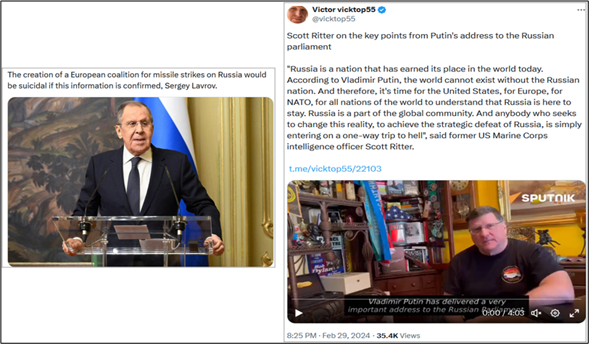
Scott Ritter on Putin’s Address to Russian Parliament, February 29, 2024.
Russian President Vladimir Putin delivered his State of the Nation to the Russian Federal Assembly (parliament) on Thursday, February 29, touching upon several pressing domestic and internal issues, including the special military op and new and advanced weapons. His address was two weeks before Russia’s 2024 presidential election. Putin warned that any deployment of Western troops in Ukraine would have “tragic” consequences. He claimed Western rhetoric threatened a “conflict with the use of nuclear arms and consequently the destruction of civilization”.
His comments appear to respond to French President Macron, who earlier this week did not rule out sending Western soldiers to Ukraine. The English text version of his address is available in this link here.
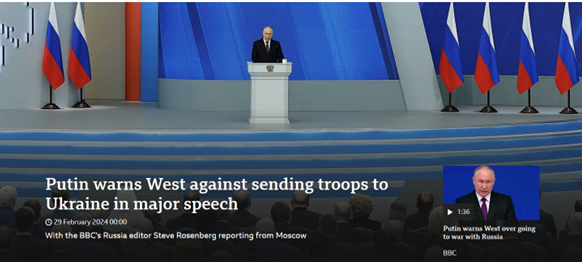
From the great power viewpoint an interesting part of his speech was the message, where the Russian leader noted that all the plans for the armament field that he put forward during his 2018 address have now either been implemented or are being finalized.
President Putin announced that the new Sarmat super-heavy intercontinental ballistic missiles (ICBM) are now in service with the Russian army. First mass-produced Sarmat missiles have been delivered to the troops. “We will soon demonstrate them in combat in their deployment areas,” he said. Likewise, Russia’s strategic nuclear forces are on full alert for their guaranteed deployment, Putin stressed.
Putin mentioned the Kinzhal hypersonic air-launched ballistic missile that is not merely in service with the Russian troops but is used to strike high-value targets in the special operation with great success. He added that Zircon sea-launched hypersonic cruise missiles have already been used in combat and are also in service with the armed forces.
The leader emphasized that the Burevestnik’s trials are being completed and that tests have confirmed the missile’s capabilities and combat performance. Burevestnik is a nuclear-powered nuclear-armed cruise missile with unlimited range. The tests for the Burevestnik cruise missile and Poseidon unmanned underwater vehicle are being completed. These systems have confirmed their outstanding, it is no exaggeration to say, unique characteristics,” he underlined. He told that the Avangard intercontinental hypersonic systems and the Peresvet laser complex are on combat duty.
At the same time, Putin stressed how important it is to work with other countries to build a new security system. “It is obvious that it is necessary to work on drafting new outlines for equal and indivisible security of Eurasia in the near future. We are ready for detailed talks on the matter with all interested countries and associations,” Putin noted.


